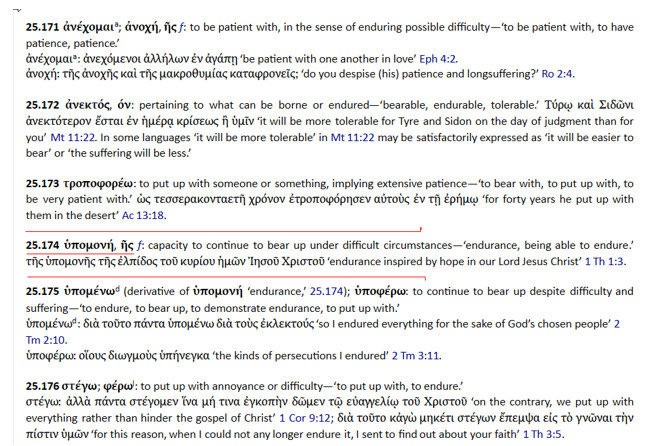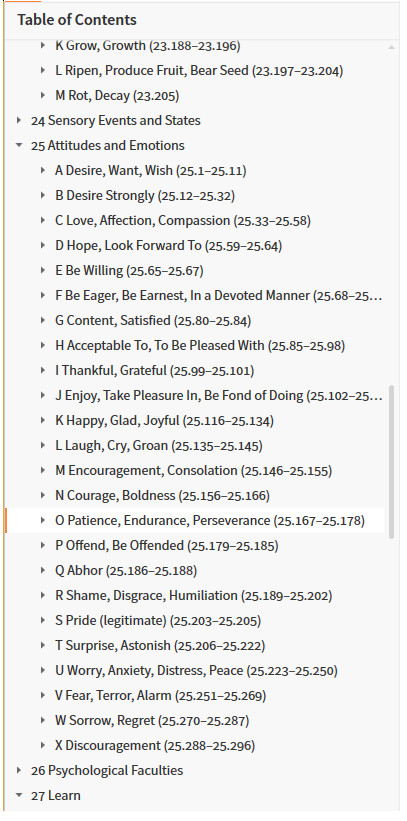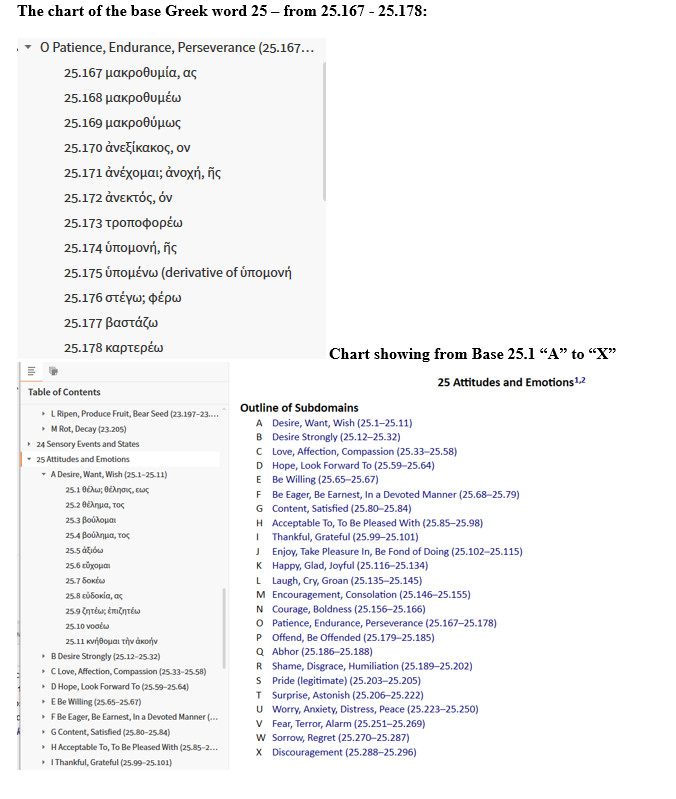Louw-Nida Lexicon
- 2019-01-16
- By Editor
- Posted in Bible Study, Word Study
Louw-Nida Lexicon (Dictionary) – How definitions are formulated for the Greek words…
Word found at James 1:4 for our example.
NASB: 4 And let aendurance have its perfect result, so that you may be bperfect and complete, lacking in nothing. 
Note the LN25.174 word for the Greek word “ho hypomone” – LN25.174 Louw Nida Lexicon.
Louw Nida Defined: Overview. Louw-Nida Greek Lexicon is a modern Greek lexicon using the concept of “semantic domains.”. This lexicon differs from other lexicons in that it does not arrange words alphabetically and it does not give one listing of a word with all of that word’s meanings after it. Instead, it breaks words down by their various shades of meaning.
Louw Nida Explained by Logos – Faithlife Corporation:
Louw-Nida Greek Lexicon is a modern Greek lexicon using the concept of “semantic domains.” This lexicon differs from other lexicons in that it does not arrange words alphabetically and it does not give one listing of a word with all of that word’s meanings after it. Instead, it breaks words down by their various shades of meaning. It then groups all of those entries together and organizes them by topics and sub-topics. It shows the nuances in word meanings and explains difficult expressions and idiomatic usages of words, and even provides advice on how words might be translated under various conditions. Since it groups words by meanings, it shows distinctions in meaning between similar words, and also between differences in one word’s meaning in different contexts, as well as showing the overlaps between word meanings.
In this study, I will try to explain and show you screen shots of the pages found in the Louw-Nida Lexicon:
The dictionary places words in a “semantic domain” and assigned via a numbering system.
This particular sub domain numbering is from 25.167 – 25.178…. Note the base “25” – Go to the chart on page 3 or 4 in order to see how this section subdivided and named: Title: “25 Attitudes and Emotions” and has a listing of “A to X” nuisances of the Root. That ‘root’ being under the domain (category) of “attitudes and Emotions” To help with understand this each word they are broken down to a subsection. i.e. “A” domain is “Desire, Want, Wish (25.1-25.11) Skipping to our section of “O” is Identified as “Patience, Endurance, Perseverance (25.167-25.178) The 1st two numbers i.d. the sub division of “25” has decimole placement starting with 25.1 (Desire, Want, Wish) to 25.288-25.296 “X – Discouragement” being the last for this semantic domain.
Here is a listing of
O Patience, Endurance, Perseverance (25.167–25.178)
25.167 μακροθυμία, ας f: a state of emotional calm in the face of provocation or misfortune and without complaint or irritation—‘patience.’ μιμηταὶ δὲ τῶν διὰ πίστεως καὶ μακροθυμίας κληρονομούντων τὰς ἐπαγγελίας ‘but imitators of those who through faith and patience inherited the promises’ He 6:12; ὑπόδειγμα λάβετε, ἀδελφοί, τῆς κακοπαθείας καὶ τῆς μακροθυμίας τοὺς προφήτας ‘fellow believers, take the prophets as an example of suffering and patience’ or ‘… patience in the face of suffering’ Jas 5:10. In a number of languages ‘patience’ is expressed idiomatically, for example, ‘to remain seated in one’s heart’ or ‘to keep one’s heart from jumping’ or ‘to have a waiting heart.’
25.168 μακροθυμέωa: (derivative of μακροθυμία ‘patience,’ 25.167) to demonstrate patience despite difficulties—‘to be patient, to remain patient, to wait patiently.’ καὶ οὕτως μακροθυμήσας ἐπέτυχεν τῆς ἐπαγγελίας ‘and so after waiting patiently, he received what was promised’ He 6:15; μακροθύμησον ἐπ’ ἐμοί, καὶ πάντα ἀποδώσω σοι ‘be patient with me and I will repay you everything’ Mt 18:26.
25.169 μακροθύμως: (derivative of μακροθυμία ‘patience,’ 25.167) pertaining to being patient—‘patiently.’ διὸ δέομαι μακροθύμως ἀκοῦσαί μου ‘therefore I beg you to listen to me patiently’ Ac 26:3. In Ac 26:3 it may be necessary in some languages to spell out the implications of μακροθύμως, for example, ‘therefore I beg you to listen to me without interrupting’ or ‘… without stopping me.’
25.170 ἀνεξίκακος, ον: pertaining to enduring difficulties without becoming angry or upset—‘tolerant, patient.’ ἀλλὰ ἤπιον εἶναι πρὸς πάντας, διδακτικόν, ἀνεξίκακον ‘but be kind to all, a good teacher, and patient’ 2 Tm 2:24.
25.171 ἀνέχομαιa; ἀνοχή, ῆς f: to be patient with, in the sense of enduring possible difficulty—‘to be patient with, to have patience, patience.’
ἀνέχομαιa: ἀνεχόμενοι ἀλλήλων ἐν ἀγάπῃ ‘be patient with one another in love’ Eph 4:2.
ἀνοχή: τῆς ἀνοχῆς καὶ τῆς μακροθυμίας καταφρονεῖς; ‘do you despise (his) patience and longsuffering?’ Ro 2:4.
25.172 ἀνεκτός, όν: pertaining to what can be borne or endured—‘bearable, endurable, tolerable.’ Τύρῳ καὶ Σιδῶνι ἀνεκτότερον ἔσται ἐν ἡμέρᾳ κρίσεως ἢ ὑμῖν ‘it will be more tolerable for Tyre and Sidon on the day of judgment than for you’ Mt 11:22. In some languages ‘it will be more tolerable’ in Mt 11:22 may be satisfactorily expressed as ‘it will be easier to bear’ or ‘the suffering will be less.’
25.173 τροποφορέω: to put up with someone or something, implying extensive patience—‘to bear with, to put up with, to be very patient with.’ ὡς τεσσερακονταετῆ χρόνον ἐτροποφόρησεν αὐτοὺς ἐν τῇ ἐρήμῳ ‘for forty years he put up with them in the desert’ Ac 13:18.
25.174 ὑπομονή, ῆς f: capacity to continue to bear up under difficult circumstances—‘endurance, being able to endure.’ τῆς ὑπομονῆς τῆς ἐλπίδος τοῦ κυρίου ἡμῶν Ἰησοῦ Χριστοῦ ‘endurance inspired by hope in our Lord Jesus Christ’ 1 Th 1:3.
25.175 ὑπομένωd (derivative of ὑπομονή ‘endurance,’ 25.174); ὑποφέρω: to continue to bear up despite difficulty and suffering—‘to endure, to bear up, to demonstrate endurance, to put up with.’
ὑπομένωd: διὰ τοῦτο πάντα ὑπομένω διὰ τοὺς ἐκλεκτούς ‘so I endured everything for the sake of God’s chosen people’ 2 Tm 2:10.
ὑποφέρω: οἵους διωγμοὺς ὑπήνεγκα ‘the kinds of persecutions I endured’ 2 Tm 3:11.
25.176 στέγω; φέρωl: to put up with annoyance or difficulty—‘to put up with, to endure.’
στέγω: ἀλλὰ πάντα στέγομεν ἵνα μή τινα ἐγκοπὴν δῶμεν τῷ εὐαγγελίῳ τοῦ Χριστοῦ ‘on the contrary, we put up with everything rather than hinder the gospel of Christ’ 1 Cor 9:12; διὰ τοῦτο κἀγὼ μηκέτι στέγων ἔπεμψα εἰς τὸ γνῶναι τὴν πίστιν ὑμῶν ‘for this reason, when I could not any longer endure it, I sent to find out about your faith’ 1 Th 3:5.
φέρωl: ἤνεγκεν ἐν πολλῇ μακροθυμίᾳ σκεύη ὀργῆς ‘he was very patient in enduring those who were objects of his anger’ Ro 9:22.
25.177 βαστάζωc: (similar in meaning to ὑποφέρω ‘to endure,’ 25.175, but probably somewhat more emphatic in meaning) to continue to bear up under unusually trying circumstances and difficulties—‘to endure, to bear up under.’ ὃν οὔτε οἱ πατέρες ἡμῶν οὔτε ἡμεῖς ἰσχύσαμεν βαστάσαι ‘which neither our forefathers nor we were able to bear up under’ Ac 15:10.
25.178 καρτερέω: to continue to persist in any undertaking or state—‘to persevere, to persist.’ τὸν γὰρ ἀόρατον ὡς ὁρῶν ἐκαρτέρησεν ‘he persevered as if he saw him who is invisible’ He 11:27. P Offend, Be Offended (25.179–25.185)[1] – The “O” domain is thus:
The definitions of 25.171 to – 25.176 with our word 25.174 highlighted:
Read the ones above and below to see the progression of variance in the meaning from the Greek base word to the 25.178 Greek Word. (Note chart of this on next page…)
(LN-TOC)
(ChartWrd25)
[1] Louw, J. P., & Nida, E. A. (1996). Greek-English lexicon of the New Testament: based on semantic domains (electronic ed. of the 2nd edition., Vol. 1, pp. 306–307). New York: United Bible Societies.
Recent Posts
Archives
- April 2022
- February 2022
- November 2021
- October 2021
- August 2021
- July 2021
- May 2021
- April 2021
- September 2020
- August 2020
- June 2020
- March 2020
- February 2020
- November 2019
- October 2019
- September 2019
- August 2019
- July 2019
- June 2019
- May 2019
- January 2019
- December 2018
- October 2018
- August 2018
- June 2018
- February 2018
- January 2018
- December 2017
- November 2017
- January 2017
- December 2016
- November 2016
- October 2016
- September 2016
- August 2016
- July 2016
- June 2016
- May 2016
- April 2016
- March 2016
- February 2016
- January 2016
- December 2015
- November 2015
- September 2015
- August 2015
- June 2015
- January 2015
- December 2014
- November 2014
- October 2014
- September 2014
- August 2014
- July 2014
- June 2014
- May 2014
- April 2014
- March 2014
- February 2014
- January 2014
- December 2013
- November 2013
- October 2013
- September 2013
- August 2013
- July 2013
- June 2013
- May 2013
- April 2013
- February 2013
- January 2013
- December 2012
- November 2012
- October 2012
- September 2012
- August 2012
- July 2012
- August 2011
Categories
- Bible Discussion
- Bible Questions Answered
- Bible Study
- Bible Study Made Easy
- Bible Study Via Software
- Bible Topics
- Christ day and time
- Demo Articles
- Developing
- FP RokTabs #1
- FP RokTabs #2
- God's Amazing Convents
- History of the English Bible
- Home & Family
- Illustrations
- Manifestations
- Marriage
- Men
- Men in the Bible
- RokNewsFlash
- RokNewsPager
- RokStories
- Spirituality
- Sub RokTabs
- Uncategorized
- Various Articles/Topics
- Word
- Word Study



